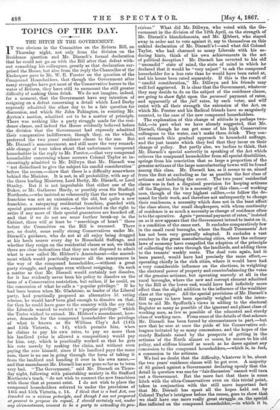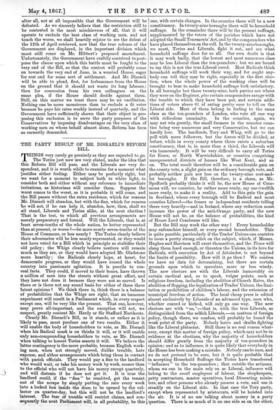TOPICS OF THE DAY.
THE HITCH IN THE GOVERNMENT.
IT was obvious in the Committee on the Reform Bill, on Thursday night, not only from the division on the Residence question and Mr. Disraeli's formal declaration that he could not go on with the Bill after that defeat with- out consulting his colleagues, greatly as that declaration sur- prised the House, but also from the reply the Chancellor of the Exchequer gave to Mr. W. E. Forster on the question of the Compound Householders, that though the Government after many struggles have got most of the Conservative horses to the water of Reform, they have still to surmount the still greater difficulty of making them drink. We do not imagine, indeed, for a moment, that the Government have any intention of resigning on a defeat concerning a detail which Lord Derby expressly admitted the other day to be a fair question for discussion, and which Sir John Pakington, in resisting Mr. Ayrton's motion, admitted not to be a matter of principle. There was nothing like a party struggle made for the resi- dence clause, and indeed the House evidently believed before the division that the Government had expressly admitted their comparative indifference, though they, on the whole, preferred the two years' residence clause to the one. But Mr. Disraeli's announcement, and still more the very remark- able change of tone taken about that unfortunate compound householder in the reply to Mr. Forster,—that very compound householder concerning whose sorrows Colonel Taylor so in- sinuatingly admitted to Mr. Dillwyn that Mr. Disraeli was " not disinclined to give the subject his candid consideration" before the recess,—show that there is a difficulty somewhere behind the Minister. It is not, in all probability, with any of the three leading Ministers, Lord Derby, Mr. Disraeli, or Lord Stanley. But it is not improbable that either one of the Dukes, or Mr. Gathorne Hardy, or possibly even Sir Stafford Northcote,—who insisted so vehemently that the new borough franchise was not an extension of the old, but quite a new franchise, a ratepaying residential franchise, guarded with special guarantees of its own,—have insisted on the right to retire if any more of their special guarantees are knocked off, and that if we do not see some further break-up in the Cabinet, there will at least be " searchings of heart " there before the Committee on the Bill is resumed. There are, no doubt, some really strong Conservatives under Mr. Disraeli's guidance, who do not at all enjoy being dragged at his heels nearer every day to Household Suffrage, and whether they resign on the residential clause or not, we think there are clear indications that they are not disposed to admit what is now called Mr. Hibbert's Amendment—the amend- ment which would practically remove all the annoyances in the way of the compound householder,—without a great party struggle, and perhaps even without resigning. On such a matter as that Mr. Disraeli would certainly not dissolve, for it has evidently never been his policy to dissolve on the issue of a Conservative restriction, but rather, if he could, on the concession of what he calls a " popular privilege." If he had been beaten when Mr. Gladstone, as leader of the Liberal party, had practically proposed an alternative W. rating scheme, he would have been glad enough to dissolve on that, for then he could have gone to the country with the cry that the Liberals wanted to restrict a " popular privilege " which the Tories wished to extend. Mr. Hibbert's amendment, how- ever, demands for the compound householder the privilege of what is known as Sir William Clay's Act (14th and 15th Victoria, c. 14), which permits him, when he claims to pay his own rates, to pay no more than his landlord (who is allowed a composition) would pay for him, nay, which is practically worked so that he gets his vote merely by making the claim, and without even paying the rate himself, since if his landlord pays the same sum, there is no use in going through the form of taking it from the landlord and handing it over in his own name,— and that amendment Mr. Disraeli has now gone so far as to term very bad. " The Government," said Mr. Disraeli on Thurs- day night, following with painstaking anxiety in Sir Stafford Northcote's track, " do not wish to connect the new franchises with those that at present exist. I do not wish to place the compound householders referred to under the provisions of 14th and 15th Victoria, c. 14. I think that is a bad Act, one founded on a vicious principle, and though I am not prepared at present to propose its repeal, I should certainly not, under any circumstances, consent to be a party to extending its pro- visions." What did Mr. Dillwyn, who voted with the Go- vernment in the division of the 12th April, on the strength of Mr. Disraeli's blandishments, and Mr. kEibbert, who staved away in order not to vote against it, say to themselves on this unkind declaration of Mr. Disraeli's ?—and what did Colonel Taylor, who had charmed so many Liberals with his se- ducing hints, think of his own achievements in the art of political deception ? Mr. Disraeli has reverted to his old "uncandid " state of mind, the state of mind in which he declared that it would be "very unjust" to ask the compound householder for a less rate than he would have been rated at, had his house been rated separately. If this is the result of " candid consideration," Mr. Dillwyn and his friends may- well feel aggrieved. It is clear that the Government, whatever they may decide to do on the subject of the residence clause, are going to show fight upon the personal payment of rates; and apparently of the full rates, by each voter, and will resist with all their strength the extension of the Act, on which Mr. Forster and his Radical friends have so sanguinely counted, to the case of the new compound householders.
The explanation of this change of attitude is perhaps two- fold,—in part what we have already suggested, that Mr_ Disraeli, though he can get some of his high Conservative colleagues to the water, can't make them drink. They can- not stomach this gradual approach to household suffrage, and the just taunts which they feel that they incar on their change of policy. But partly also, we incline to think, that; Mr. Disraeli's special austerity in speaking of the Act which relieves the compound householder from all special disabilities, springs from his conviction that so large a proportion of the genuine artizans of the large manufacturing towns will be found' among this class. Mr. Disraeli has, as it seems to us, aimed from the first at excluding as far as possible the best class of artizans and including the worst. The two years' residential clause was in fact a disguised provision for keeping artisans• off the Register, for it is a necessity of this class,—of working men, though of the very highest calibre,—to follow the de- mand for their work, and therefore not unfrequently to change their residences, a necessity which does not in the least affect' the class above, the small shopkeepers, with whom continuity of residence is as much a necessity as change of residence often' is to the operative. Again "personal payment of rates," insisted" on as it now appears that the Government intend to insist on it,. is a condition of the same sort. It excludes comparatively few in the small rural boroughs, where the Small Tenements' Act has not been very generally adopted. It excludes a vast number in the great manufacturing cities, where the ordinary laws of economy have compelled the adoption of the principle of collecting the rates through the landlords, and adding them to the tenants' weekly rents. The dual vote again, had it- been passed, would have had precisely the same effect,— operating chiefly in the rich cities, where it would have had a very considerable influence on the elections, in weighting the electoral power of property and counterbalancing the votes• of the genuine artisans, but operating scarcely at all in the rural boroughs, where the new and corrupt element admitted by the Bill at the lower end, would have had infinitely more effect than the slight addition to the influence of the wealthier class at the upper. All the special provisions of Mr. Disraeli's: Bill appear to have been specially weighed with the inten- tion to aid Mr. Spofforth's views in adding to the electoral Register as many as possible of the ignorant and pliant class of working men, as few as possible of the educated and sturdy class of working men. From some of the details of that scheme: Mr. Disraeli has been forced by circumstances to part,—but now that he sees at once the pride of his Conservative col- leagues irritated by so many concessions, and the hopes of the- sturdy Radicals raised by the prospects of getting in the artizans 'of the North almost en masse, he recurs to his old policy, and stiffens himself as much as he dares against any concession to the compound householders,—which is, in fact,. a concession to the artizans.
We feel no doubt that the difficulty, i;vhatever it be, about the two years' residence clause will be got over. A majority of 81 gained against a Government declaring openly that the detail in question was one for "fairdiscussion" cannot well turn out a Government. But the mere fact that there is soma hitch with the ultra-Conservatives even on this trivial point, taken in conjunction with the still more important fact that Mr. Disraeli has upset all the hopes held out by Colonel Taylor's intrigues before the recess, goes to show that we shall have one more really great struggle on the special. fine inflicted on the compound householder,—in which it is, ,, after all, not at all impossible that the Government will be defeated. As we sincerely believe that the restriction still to be contested is the most mischievous of all, that it will operate to exclude the best class of working men, and not `touch the worse, we shall heartily rejoice to see the defeat of the 12th of April retrieved, now that the true colours of the 'Government are displayed, in the important division which must still come on Mr. Hibbert's proposed amendment. 'Unfortunately, the Government have craftily contrived to post- -pone the clause upon which this battle must be fought to the very end of the Bill, so that the contest will probably come on towards the very end of June, in a wearied House, eager for rest and for some sort of settlement. And Mr. Disraeli will be able to plead, first, for forbearance from the House on the ground that it should not waste its long labours ; then for concession from his own colleagues on the same plea, if the House should decide against them. Still, on this matter we trust there may be no vacillation. Nothing can be more monstrous than to exclude a fit voter because he pays his rates weekly instead of quarterly, and the 'Government have sufficiently shown that their object in pro- Toeing this exclusion is to serve the party purposes of the Conservatives by imposing disadvantages on the very class of -working men on whose behalf almost alone, Reform has been so earnestly demanded.































 Previous page
Previous page